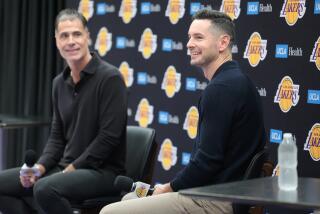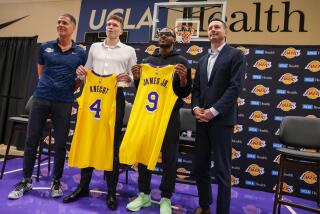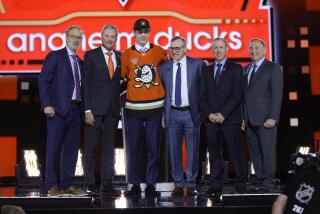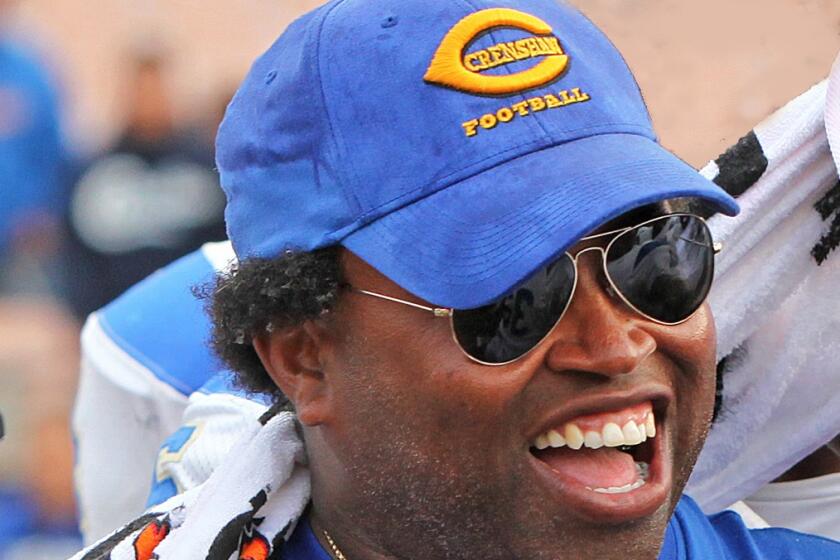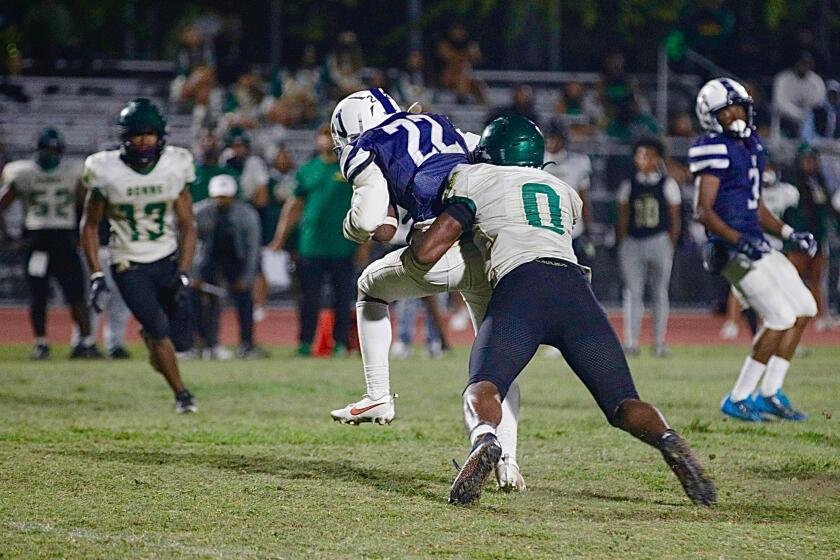NBA DRAFT : Blockbuster Trade That Wasnât Overshadows Player Selections
Scottie Pippen did not become a Seattle SuperSonic.
Shawn Kemp did not become a Chicago Bull.
For the record:
12:00 a.m. July 1, 1994 For the Record
Los Angeles Times Friday July 1, 1994 Home Edition Sports Part C Page 14 Column 2 Sports Desk 1 inches; 19 words Type of Material: Correction
NBA draft--A story in Thursdayâs editions incorrectly referred to Voshon Lenard as being from Michigan State. He attended Minnesota.
The NBA draft turned out to be less exciting without the reported trade of superstars that would have shaken the balance of power but finally fell through.
The Bulls, three-time champions from 1991-93 and the No. 1 team in the East going into the last weekend this season, have decided that without Michael Jordan they should begin rebuilding and recently began shopping Pippen.
They found an interested party in the SuperSonics, 63-game winners last season, now being run by a hastily assembled front office after the departure of General Manager Bob Whitsitt. After a spring of turmoil that included their first-round playoff loss, SuperSonic Coach George Karl was even willing to discuss trading Kemp, at 24 four years younger than Pippen.
The deal they were working on would have sent Pippen, Will Perdue and the Bullsâ No. 21 pick to Seattle for Kemp, 35-year-old Ricky Pierce and the SuperSonicsâ No. 11 pick. But talks broke off Wednesday.
âI have tremendous respect for Scottie Pippen but I have tremendous respect for Shawn Kemp, too,â Karl said. âItâs not very often you get the opportunity to talk about a great player. But we think Shawn is a great player, too, and heâs going to be a great player for many, many years.â
The draft was almost anticlimactic. The selections went largely according to the consensus--Glenn Robinson to the Milwaukee Bucks, Jason Kidd to the Dallas Mavericks, Grant Hill to the Detroit Pistons, etc.
The Bucks got Robinson, the college player of the year, a 6-foot-7, 240-pound powerhouse of a small forward who averaged 30 points as a sophomore and made 39% of his three-point shots in his two seasons at Purdue. With a second first-round choice, they got Eric Mobley, a 6-10, 260-pound center from Pitt. With 6-11 Vin Baker, who had a big rookie season, Milwaukee suddenly has a young front line bursting with potential after the team won only 20 games last season.
The Mavericks took Kidd, considered by some, including Magic Johnson, to be the finest point guard prospect since Johnson in 1979. Then with the 19th pick, they got Tony Dumas, a talented 6-4 guard from Missouri Kansas City.
The Pistons took Hill, Dukeâs all-around star who had measured out to be even bigger than anyone thought--6-8, 230 pounds--after playing both guard spots and small forward for the Blue Devils.
The Minnesota Timberwolves took Marshall, a 6-9 small forward who was the Big Eastâs player of the year. With the third pick on the second round, they got Boston Collegeâs Howard Eisley, a point guard who can shoot but was pushed off the first round in the rush for the big players.
The Washington Bullets, long in need of big players, grabbed 6-8 1/2, 253-pound Juwan Howard, who had been the other Twin Tower to Chris Webber at Michigan, then found Marquetteâs 7-1 Jim McIlvaine, an unpolished shot blocker whoâd been expected to go on the first round, waiting for them five picks into the second.
Drafting No. 16, Golden State Coach Warrior Don Nelson pulled his annual surprise, selecting Louisvilleâs Cliff Rozier, a 6-10, 260-pound center who had scared so many teams off with his lethargic play in the NCAA tournament that he was given a chance of dropping off the first round.
As usual, the second round turned into a longshot grab bag.
The Boston Celtics used the 36th pick for a 6-10 Russian, Andrei Fetisov, then traded his rights and forward Ed Pinckney to the Bucks for Blue Edwards and Derek Strong.
Nineteen-year-old Dontonio Wingfield, who left Cincinnati after his freshman year, went to Seattle at No. 37, where he probably wonât get a guaranteed contract.
At No. 44, the Indiana Pacers took Damon Bailey, the home-state idol whose career at Indiana never lived up to the compliments Bobby Knight lavished on him when he saw him playing in eighth grade.
At 41, the Pacers selected William Njoku, a 6-9 forward who was born in Ghana, attended college in Nova Scotia and played on the Canadian national team.
At 46, the Bucks took Michigan Stateâs Voshon Lenard, who made himself available for the draft after his junior year to the surprise of scouts who said he would have been better off staying in school.
With the last pick, No. 54, the SuperSonics took a 6-11 Serb, Zelkjo Rebraca, proving basketball is, indeed, international.
More to Read
Go beyond the scoreboard
Get the latest on L.A.'s teams in the daily Sports Report newsletter.
You may occasionally receive promotional content from the Los Angeles Times.
